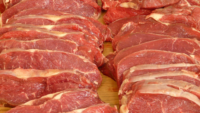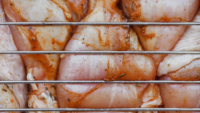Antimicrobial Resistance in UK Lamb and Turkey Meat

A recent survey by the Food Standards Agency (FSA) and Animal and Plant Health Agency (APHA) has laid the groundwork for UK officials to monitor antimicrobial resistance (AMR) in bacteria from lamb and turkey meat nationwide. The study surveilled Escherichia coli and Campylobacter from lamb and turkey meats on retail sale in the UK between October 2020 and February 2021. Previous surveys on AMR in UK retail meats focused on beef, chicken, and pork; the recent study was conducted to fill the evidence gap for lamb and turkey.
Antimicrobial drugs are prescribed to both humans and animals to treat and prevent bacterial infections. AMR in bacteria is cause for concern because it can make foodborne illness difficult to treat.
A total of 210 lamb and turkey meat products, respectively, from across the UK were sampled. Lamb and turkey were both tested for E. coli, and only turkey was tested for Campylobacter. E. coli isolates can be useful indicators of AMR in gut bacteria. The bacteria samples were tested for AmpC and Extended Spectrum Beta Lactamase (ESBL) type resistance. As recommended by the EU, additional tests were done to identify carbapenem type resistance in E. coli; carbapenems are considered “last resort” drugs, only used to treat severe infections with multiple resistances. APHA followed EU methodologies in their testing, which involved growth of bacteria culture on selective agar media containing the antimicrobial drug cefotaxime.
The study found that 0.95 percent of lamb samples and 11.4 percent of turkey samples were positive for AmpC/ESBL-phenotype E. coli. While this is the first time AMR in retail lamb and turkey meat has been studied for AmpC/ESBL-phenotype E. coli in the UK, the results for lamb meat are similar to those previously obtained for retail beef and pork meat, and the results for turkey are similar to those previously obtained for chicken meat. None of the retail lamb and turkey samples were positive for E. coli on the carbapenemase agars.
For Campylobacter, the study found low prevalence in turkey meat at 10.5 percent, with low numbers of viable counts in the great majority (95% <1000cfu/g) of positive samples. It was also discovered that turkey samples with skin were significantly more likely to be contaminated with Campylobacter than skinless turkey samples.
The study’s results provides baseline figures for AMR found in UK retail lamb and turkey, which did not previously exist.
Looking for a reprint of this article?
From high-res PDFs to custom plaques, order your copy today!






